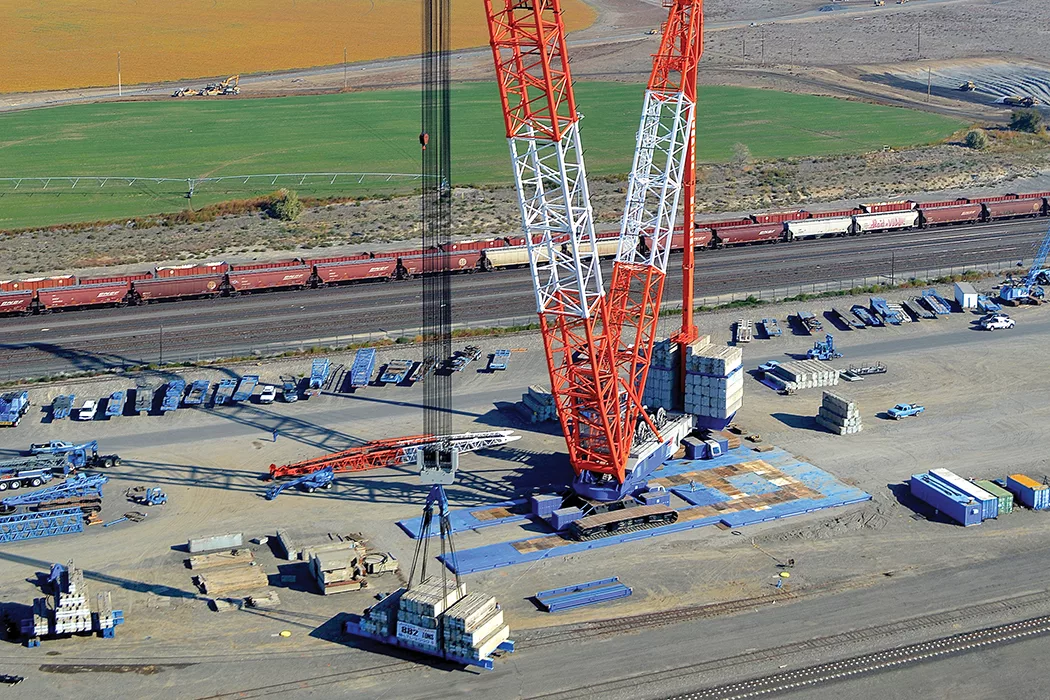
Home » 9 questions about cranes, Covid-19 and the economy with Lampson International
9 questions about cranes, Covid-19 and the economy with Lampson International

June 15, 2020
Lampson International is the Kennewick-based manufacturer of heavy lift cranes used all over the world. The company employs 300 people worldwide, with offices in the U.S., Canada and Australia, and it has performed work in more than 55 counties in the 74 years that it has been in business.

Kate Lampson is the director of communications for the company and also serves on the board of the Association of Washington Business, including its Rebound and Recovery Task Force and its personal protection equipment, or PPE, subcommittee to promote manufacturing of protective equipment during the Covid-19 pandemic.
She shares how her family-owned company has been affected by the global Covid-19 crisis and Washington’s Stay Home, Stay Healthy order.
Tell us about Lampson International and its history.
The company was founded in 1946 by my grandparents Neil and Billie Jane Lampson. It is third-generation family-owned and operated. My father, Bill Lampson, is the current president and chief executive officer, and my brother Peter Lampson and I work closely with him every day in management roles.
What types of projects are Lampson cranes used on? What makes your cranes unique?
Lampson cranes are deployed for refinery work within the oil and gas industry, infrastructure projects including bridge construction and new stadium construction, the building of power plants, work at various ports both domestic and international and offshore refinery work.
We typically use our proprietary product, the Lampson Transi-Lift to perform these types of projects. What makes the Lampson Transi-Lift unique is its ability to move forward, backward and sideways in a crab-like configuration while picking and carrying a load. These particular cranes range from 350 US Ton to 3000 US Ton and perform work all over the world.
How has the Covid-19 pandemic affected Lampson?
Lampson International was fortunate that due to the types of customers that we have and the industries that we service, we were deemed an essential business in the beginning of the pandemic. We have been able to remain with our doors open and business per usual.
Who are your customers and how are they reacting?
We have customers in the energy sector, health care industry, agriculture community, emergency services, transportation and logistics and the defense industry to name a few. Although some of these industries may have slowed, our customers continue to move forward with projects of various types.
Do you/they anticipate a slowdown?
With regard to heavy lift projects specifically, we have seen a few projects put on hold. However, the majority of our heavy lift projects remain unaffected.
How did the Stay Home, Stay Healthy order affect Lampson?
We have ensured that our office and shop facilities are in compliance with the governor’s Stay Home, Stay Healthy mandate and are continuing to follow those guidelines.
Did you have to lay off or furlough employees?
No, as an essential business we did our best to keep everyone employed and busy during this difficult time.
What were your thoughts on producing personal protective equipment?
We specialize in the manufacturing of extremely large pieces of equipment and it takes large machines to make these components. In order to pivot to making the type of PPE that is required to help fight the Covid-19 virus, we would need much smaller and much more precise machining tools to do this job. It did not make sense for us to pivot.
Although we did not participate as a company in pivoting to make PPE, we are longstanding members of the Association of Washington Business and I serve on the AWB Rebound and Recovery Task force as well as the PPE subcommittee. It has been a great experience working with other manufacturers around the state to help provide businesses with the resources they need to safely reopen and to reopen as soon as possible. Business owners who are interested in finding resources for reopening their locations can go to reboundandrecovery.org to learn more.
What is the status of the huge crane stored at the Port of Pasco?
This crane is owned by Hitachi Transport Limited. They were due to take delivery of it back in 2012, but with the earthquake and tsunami in Japan, they asked us to keep it here in the United States. For now, we are storing it for them at our test facility in Pasco. We continue to exercise it on a regular basis. Hitachi is expected to take delivery in Japan in spring 2020 at its Oma Nuclear Power Plant site.
Local News Manufacturing
KEYWORDS june 2020





